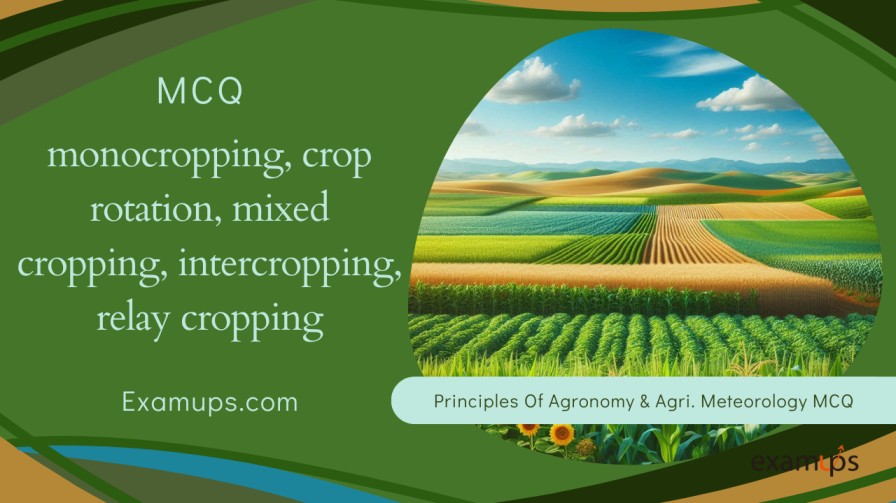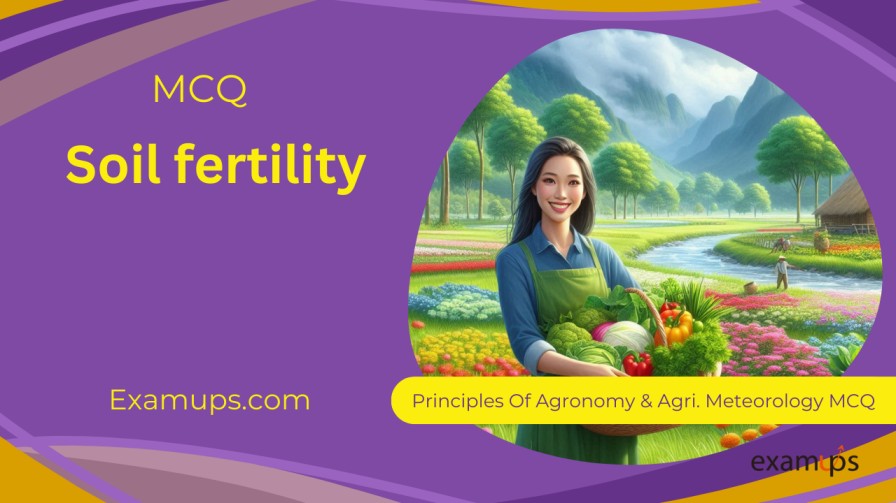Cropping Systems MCQ for ICAR-JEF, ICAR-SRF, ICAR-NET, IBPS-AFO/SO, Pre-PG, BHU Pre-PG, IFFCO-AGT, CCI, FCI, B.sc, M.sc, etc.
Here are 20 multiple-choice questions (MCQs) related to cropping systems, with answers and explanations. These cover concepts such as monocropping, crop rotation, mixed cropping, intercropping, relay cropping, and more:
Question 1:
What is the definition of monocropping in agriculture?
- A. Growing only one crop on a piece of land year after year
- B. Growing multiple crops on the same piece of land in a single growing season
- C. Rotating different crops on the same piece of land
- D. Planting crops in a sequence over a fixed period
Answer: A. Growing only one crop on a piece of land year after year
Explanation: Monocropping involves growing a single crop on the same land for consecutive years. It can deplete soil nutrients and increase pest and disease vulnerability.
Question 2:
Which of the following is a common disadvantage of monocropping?
- A. Increased soil fertility
- B. Increased susceptibility to pests and diseases
- C. Improved water retention
- D. Reduced soil erosion
Answer: B. Increased susceptibility to pests and diseases
Explanation: Continuous monocropping creates an environment for pests and diseases to thrive, as there’s no crop diversity to disrupt their life cycles.
Question 3:
What is the primary principle behind crop rotation?
- A. Growing different crops in succession on a piece of land over a specific period
- B. Growing multiple crops on the same piece of land at the same time
- C. Growing crops in different sequences each year
- D. Growing crops only during certain seasons
Answer: A. Growing different crops in succession on a piece of land over a specific period
Explanation: Crop rotation helps maintain soil health by alternating crops with different nutrient needs, reducing soil depletion and disease cycles.
Question 4:
Which of the following is a key principle of crop rotation?
- A. Leguminous crops should follow non-leguminous crops
- B. Non-exhaustive crops should follow exhaustive crops
- C. Crops of the same family should be grown in succession
- D. Crops with fibrous roots should follow those with taproots
Answer: A. Leguminous crops should follow non-leguminous crops
Explanation: Legumes fix nitrogen in the soil, which benefits subsequent non-leguminous crops, improving soil fertility.
Question 5:
What is mixed cropping?
- A. Growing multiple crops on the same piece of land at the same time
- B. Rotating different crops over a period of time
- C. Growing only one crop on a piece of land
- D. Growing different crops on separate plots in the same field
Answer: A. Growing multiple crops on the same piece of land at the same time
Explanation: Mixed cropping involves cultivating different crops simultaneously on the same field to optimize resources and reduce the risk of total crop failure.
Question 6:
What is intercropping?
- A. Growing multiple crops in alternating rows or patterns within the same field
- B. Growing a second crop on the same field immediately after the first crop is harvested
- C. Growing different crops on different fields in the same farm
- D. Rotating crops over a multi-year cycle
Answer: A. Growing multiple crops in alternating rows or patterns within the same field
Explanation: Intercropping optimizes space and resources, allowing crops with complementary growth habits to share the same field.
Question 7:
What is relay cropping?
- A. Planting a second crop before the first crop is harvested
- B. Planting multiple crops in the same field at the same time
- C. Rotating crops over a fixed period
- D. Growing different crops on separate plots in the same field
Answer: A. Planting a second crop before the first crop is harvested
Explanation: Relay cropping increases land use efficiency by starting a second crop while the first is still growing, leading to continuous production.
Question 8:
What is multistoried cropping?
- A. Growing crops at different heights in the same field to maximize space
- B. Rotating crops over a multi-year cycle
- C. Growing different crops on separate plots in the same farm
- D. Planting multiple crops in alternating rows or patterns
Answer: A. Growing crops at different heights in the same field to maximize space
Explanation: This system maximizes vertical space by growing taller crops alongside shorter crops, optimizing light and resource use.
Question 9:
What is sole cropping?
- A. Growing only one crop on a piece of land during a specific period
- B. Growing multiple crops in alternating rows or patterns
- C. Growing crops at different heights in the same field
- D. Planting a second crop before the first crop is harvested
Answer: A. Growing only one crop on a piece of land during a specific period
Explanation: Sole cropping refers to cultivating a single crop on a field during a specific period or season, without combining it with other crops.
Question 10:
What is sequence cropping?
- A. Planting two or more crops in sequence on the same piece of land in a single year
- B. Growing multiple crops on the same piece of land at the same time
- C. Rotating different crops over a multi-year cycle
- D. Planting a second crop before the first crop is harvested
Answer: A. Planting two or more crops in sequence on the same piece of land in a single year
Explanation: Sequence cropping maximizes land use by planting multiple crops sequentially in one year, increasing overall productivity.










